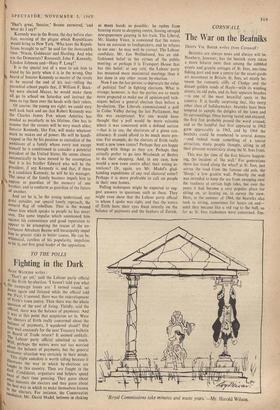TO THE POLLS
Fighting in the Dark
ALAN WATKINS writes:
'Don't go yet,' said the Labour party official at the Erith by-election. 'I haven't told you what
'• the campaign issues are.' I turned round, sat down again and listened while the official told toe. First, it seemed, there was the redevelopment of Erith's town centre. Then there was the whole question of the cost of living. Thirdly, said the official, there was the balance of payments. And 11 was at this point that scepticism set in. Were balance electors of Erith really concerned about the palance of payments, I wpndered aloud? Did they wait anxiously for the next Treasury bulletin or Board of Trade return? It seemed unlikely. Abell Labour party official admitted as much. , , perhaps the voters were not too worried about the balance of payments, but the general economic situation was certainly in their minds. in This slight anecdote is worth telling because it illustrates the way finis which by-elections are ,.31-Ight in this country. They are fought in the dark. Candidates, organisers and helpers spend what of their time guessing. They guess about the interests the electors and they guess about to b"t way in which to make themselves known co the electors. For instance, the Conservative "'dictate, 'Mr. David Made!, believes in shaking
as many hands as possible: he rushes from housing estate to shopping centre, leaving intrepid newspapermen gasping in his train. The Liberal, Mr. Stanley Vince, is convinced that the voters have an aversion to loildspeakers, and he refuses to use one: he may well be correct. The Labour candidate, Mr. Jim Wellbeloved, has an old- fashioned belief in the virtues of the public meeting; or perhaps it is Transport House that has this belief; at any rate, the Labour party has mounted more ministerial meetings than it has done in any other recent by-election.
Now I am the last person to deprecate the value of political 'feel' in fighting elections. What is strange, however, is that the parties are so much more ptepared to make use of opinion-poll tech- niques before a general election than before a by-election. The Liberals commissioned a poll in Colne Valley during the last Parliament, but this was exceptional. Yet one would have thought that a poll would be more valuable where it was concerned with a defined section —that is to say, the electorate of a given con- stituency. It could afford to be much more pre- cise. For example, do the electors of Erith really want a new town centre? Perhaps they are happy enough with things as they are. Perhaps they actually prefer to go into Woolwich or Bexley to do their shopping. And, in any case, how would a new town centre affect their voting in- tentions? Or, again, are Mr. Madel's glad- handing expeditions of any real electoral value? Perhaps it is more profitable to call on people in their own homes.
Polling techniques might be expected to sug- gest answers to •questions such as these. They might even show that the Labour party official to whom I spoke was right, and that the voters of Erith have their eyes fixed intently on the balance of payments and the bankers of Zurich.






































 Previous page
Previous page